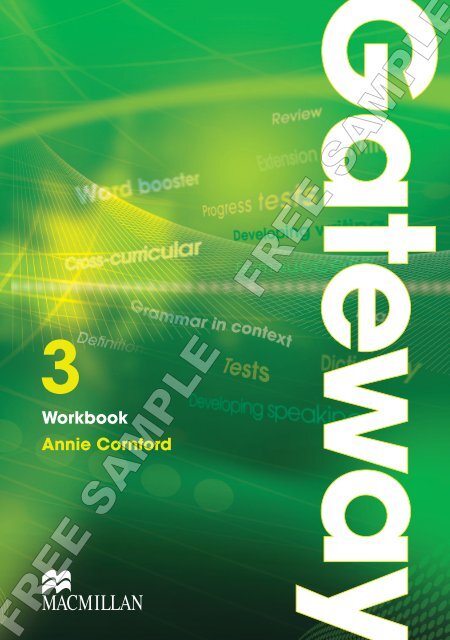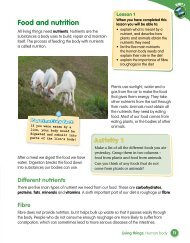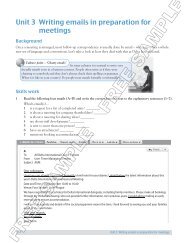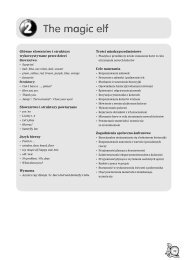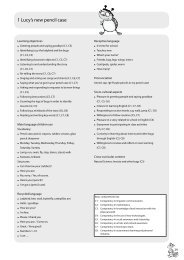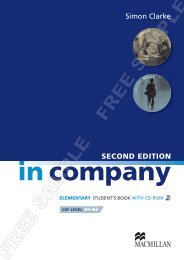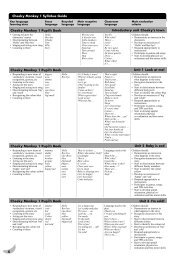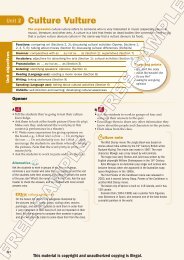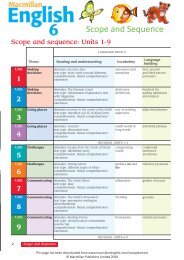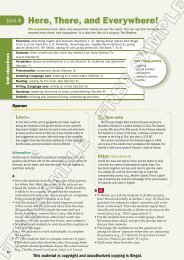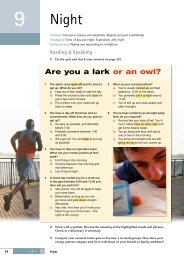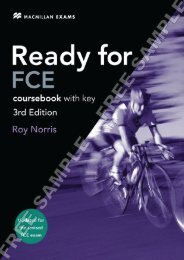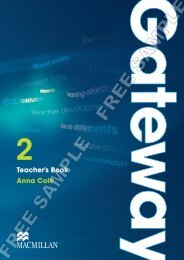Unit 8 - Macmillan
Unit 8 - Macmillan
Unit 8 - Macmillan
- No tags were found...
Create successful ePaper yourself
Turn your PDF publications into a flip-book with our unique Google optimized e-Paper software.
3WorkbookAnnie CornfordFREE SAMPLE FREE SAMPLE
Reading1 Look at the picture and the title of the text. What type of text do you think this is?aba review of a famous art exhibitiona scientific report on artists’ creativity2 Now read the text and check your answer.cda singer-songwriter’s autobiographyan artist’s guide to using brains in modern artAdvanced brain activity in artists and musiciansMany people who are not artistic believe that trained artists and musicians think differently from them, andthey are right. Psychologists have discovered that professionally trained musicians use both the left and theright sides of their brain more than the average person.People whose left hemisphereis well developed are knownto be strong in academic areassuch as reading, maths andlogic. More creative peopleoften have better developedright hemispheres, so they aretalented in creative areas likeart and music. Experiments todiscover how different typesof people solve different typesof problems have shown thatartists and musicians useboth sides of the brain moreright hemisphere:often than people who are not ‘artistic’ activities –creative.art, music, creativityNon-musicians are oftenimpressed at how pianists, for example, can read twolines of music, and play the top line with the righthand and the bottom line with the left. Violin players,too, can simultaneously perform one action with thehand holding the bow and another, different actionwith the hand on the strings. Long hours of practicegive musicians excellent coordination and skills thatnon-musicians simply don’t have.Reading the music and translating the notes intohand movements uses the left hemisphere, butperforming music is associated with right hemisphere3 Find words in the text which mean:1 people who study how the human mind works(paragraph 1) 2 very good at doing something (paragraph 2) 3 scientific tests (paragraph 2) 4 at the same time (paragraph 3) 5 related to (paragraph 4) 4 Choose the correct alternative.1 Professional musicians use both sides of the brain moreartistically/often than average people.2 The researchers say that creative thinking is normal forpsychologists/musicians.3 Musicians’ use of both hands could explain theirinterest in music/interesting brain activity.4 The research showed that musicians were better withwords/musical symbols than non-musicians.5 Non-musicians had more/fewer original ideas for uses ofcommon objects.activity. The same is true ofvisual artists, who translateideas and emotions intoimages by a process thatuses both sides of the brain.Researchers wanted tosee how creative peoplesolved problems by thinking‘outside the box’. To comparethe thinking processes ofmusicians and non-musicalpeople, a group of studentswere shown some everydayleft hemisphere:objects and asked to invent‘academic’ activities – new uses for them. Theyreading, maths, logic were then given a word test.The musicians showed moreadvanced language skills in the word test, and theyalso had more original ideas for alternative uses forthe objects.What the research does not prove is whethermusical skill is something that you are born with,or whether it can be learnt. A child who starts toplay a musical instrument at a very early age andcontinues playing it for many years may be changinghis or her brain activity by doing so. This suggeststhat the differences in a creative brain are caused asmuch by training as by genetics.5 Answer the questions with information from the text.1 Who have always believed that artistic people don’t think inthe same way as people with no artistic talent?2 The psychologists concentrated on problems that could besolved by thinking ‘outside the box’. What do you think thisexpression means?a logically b creatively c musically3 Find a sentence in the text which gives an example of whatthe right side of the brain does, and what the left side of thebrain does.6 What about you?Are the people you know who play a musical instrument good atother things? If so, what?<strong>Unit</strong> 8 65REE SAMPLE FREE SAMPLE
Grammar in contextReported speech – statements1 Complete the table with the reported speech.Direct speechReported speech‘I listen to the CD a lot.’ He said he listened to the CD a lot.‘I’m listening to the CD.’‘I have listened to the CD.’‘I listened to the CD.’‘I had listened to the CD.’‘I will listen to the CD.’‘I can listen to the CD.’‘I may listen to the CD.’‘I must/have to listen tothe CD.’He said he He said he He said he He said he He said he He said he He said he He said he 2 Complete the sentences with reported speech.1 ‘You have to be careful!’The museum guide told us that we had to be careful.2 ‘I don’t know anything about modern sculpture.’Grandad said that he anything about modern sculpture.3 ‘It may take a while for the paint to dry.’The artist told her that it a while for the paint to dry.4 ‘I can get you some cheap tickets for the gig.’My friend said that he us cheap tickets for the gig.5 ‘Non-musicians did not do so well in the tests.’The researcher told us that non-musicians so well in the tests.3 Complete the reported sentences.1 ‘I’ll be here at ten.’She said she’d be there at ten.2 ‘We saw the exhibition yesterday.’They said they’d seen the exhibition .3 ‘I’ll never forget tonight’s performance.’She said she’d never forget performance.4 ‘I may go to the play next month.’She said she might go to the play .5 ‘We went to the same gallery a week ago.’They told me they’d been to the same gallery .66 <strong>Unit</strong> 86 ‘I’m having my portrait painted tomorrow.’He said he was having his portrait painted .7 ‘We had a much friendlier audience last year.’They said they’d had a much friendlier audience .4 Rewrite the direct sentences in reported speech.1 ‘I’ve always hated modern art.’She told me (that) 2 ‘We are going to the sculpture park next week.’They said (that) 3 ‘I’m painting a picture just for you.’He told me (that) 4 ‘We’re hoping to make a new album this year.’The band said (that) 5 ‘I can’t sketch any more tonight, because it’s too dark.’She said (that) Grammar extension5 Rewrite the sentences in reported speech. Use the reportingverbs given.1 Don said to me: ‘I’ll carry your suitcases.’Don offered to carry my suitcases.2 Helen asked us: ‘Would you like to come to my party?’Helen 3 Babs said: ‘I won’t wear a coat!’Babs 4 Bernie said to me: ‘Why don’t we go to the cinema together?’Bernie 5 The doctor told me: ‘You should rest your leg for two weeks.’The doctor 6 She said to her son: ‘Don’t forget to feed the cat.’She advise invite offer refuse remind suggestREE SAMPLE FREE SAMPLE
Developing vocabularyAdjectives ending in -ing and -ed1 Choose the correct alternative.1 She was amazed/amazing when her painting was sold for £5,000.2 The lecture wasn’t very interested/interesting, but the show was.3 The success of his first play was really surprised/surprising.4 I’m afraid I was rather uninspired/uninspiring by the works of art I saw.5 The horror movie we watched last night wasn’t very frightened/frightening.6 The artist wasn’t very relaxed/relaxing at the start of his exhibition.7 The kids got bored/boring waiting for the show to start.8 They had the best seats in the theatre, but the play itself wasdisappointed/disappointing.2 Look at the pictures and make two sentences for each with thewords given.1 embarrassedI get very embarrassed when dad starts singing.embarrassingDad’s singing is always so embarrassing.2 confusedconfusing3 disappointeddisappointing4 excitedexciting13243 Look at the example, then complete the six sentencesso that they are true for you.satisfy1 The most satisfying experience I’ve had is helpinghomeless people in my city.2 I was most satisfied when I helped homeless people in my city.terrify1 The most terrifying movie I’ve ever seen is 2 I was terrified the other day when horrify1 The most horrifying news I’ve heard recently is 2 I was horrified when worry1 The most worrying thing about school for me is 2 The last time I got really worried about something wasVocabulary extension4 Here are more adjectives ending in -ing and -ed. Checkyou know the meaning of each one, then complete thesentences.amusing annoyed exhaustedfascinated pleased thrilling1 The last pop video Michael Jackson ever made wasreally .2 I was absolutely by the way heused colour.3 She was totally after her visit to theTate Gallery, but still couldn’t sleep.4 The model was very with thefinished portrait.5 The security guard in the art gallery gets if you touch anything.6 Some people find her work but personally, I don’t find it funny at all.5 Write four sentences about yourself using adjectivesfrom 4 and your own ideas.1 2 3 4 <strong>Unit</strong> 8 67REE SAMPLE FREE SAMPLE
Grammar in contextReported speech – questions and commands1 Complete the grammar rules with these words.68 <strong>Unit</strong> 8do not same statements subject whether1 Tenses and pronouns in reported questions change in theway as with reported .2 There is no inversion of the and verb as in directquestions, and question marks are needed.3 We do not use the auxiliary verb inreported questions.4 If there is no question word, we use if or .2 Complete the reported questions.1 ‘Did you see the portrait of the Queen?’He asked him .2 ‘Why are you putting your chewing gum under the desk?’She wanted to know .3 ‘Who is your favourite singer?’He wanted to know .4 ‘Do you often go to the theatre?’He asked him .5 ‘Where are the paintings by Lowry?’They wanted to know .6 ‘Will you be able to clean the marks off the painting?’He wanted to know .3 Look at the grammar rule and choose the correct alternative.For reported commands we use asked to or not to + (a) auxiliary/infinitive. If (b) necessary/possible, we change pronouns and otherwords in the same way as in reported statements.We use (c) asked/told to report stronger commands and(d) asked/told for more polite commands.4 Rewrite the sentences in direct speech.1 The painter asked her to stand still.‘Please stand still.’2 He told her to shut the door.3 The teacher told the kids not to go near the water.4 He asked her to wait for him.5 He told them not to take any photos.6 The man told her to turn her music down.7 Their mother asked them to sing their song.8 She asked the cleaners not to touch the sculpture.Grammar extension5 Complete Emma’s email using these new reporting verbs.accuse apologise congratulate insist promise warnREE SAMPLE FREE SAMPLE
Developing speakingDescribing a past event1 Put these useful words and expressions into the correctcolumn.at the beginningof a descriptionin the middle ofa descriptionat the end ofa description2 Read this dialogue and choose the correct alternative.JAKE: What’s the most embarrassing thing that’s happened toyou?SAm: That’s easy! It was when my mum asked me to go toa modern ballet with her.JAKE: So what happened?SAm: (a) At first/Next, I said I didn’t want to go, but she wasdisappointed so I went and it was awful. (b) After a while/First, we missed the bus and were nearly late. (c) In theend/Next, we realised that everybody was wearing smartclothes when I was in jeans and trainers! Then, the curtainwent up and nothing happened for ages. (d) After a while/After that, I asked mum what was going on, and peoplebehind me told me to be quiet and I started laughing.I know it was bad but I couldn’t stop. (e) First/Finally, mumgot so angry that she said we had to leave. (f) In the end/A few minutes later, we stayed until the interval but she’snever forgotten that evening. And she’ll never take me tothe ballet again …3 Write some notes about an embarrassing event that happenedto you. Remember to use the words and expressions from 1.a few minutes later after a while after thatat first finally first in the end next thenDescribing photos4 Look at this photo and answer the questions. If you are notsure of something, say I think and/or I imagine.1 Who is in the photo?2 Where is he?3 What is he doing?4 How do you think the artist is feeling?5 Now look at this photo and answer the same questions.6 What about you?What are your reactions to the two artists’ work? Write twoquestions that you would like to ask each artist.1 2 1 2 REE SAMPLE FREE SAMPLE<strong>Unit</strong> 869
Developing writingAn announcement1 Look at these tips for writing announcements and correct themistakes.1 Use long complicated sentences.70 <strong>Unit</strong> 8Use short, clear sentences.2 Don’t have a slogan.3 Remember that a title that attracts attention is not usuallynecessary.4 Give as much information as possible.2 Complete the announcement with these words.categories contact December 1stDecember 10th model shyThe Greatest Fashion Show on Earth!Saturday (a) in the school hall.Have you got the coolest outfit? Could you(b) it at our fashion show?Don’t be (c) !We need clothes for our show – and models to wear them!There are three (d) :Casual, Sporty and Out on the Town.Tell us what clothes you are planning to bring by(e) .There will be a prize for the best outfit for each category.For more information, (f) Bernie on09765 4830053 Look at these notes about another event in the school calendar.Make a poster announcing this event, using the space below.talent competitionorganisers want singers/dancers/bands/stand-up comediansnames in by Dec 3rdchance to appear on local TV for winnerevent on Dec 17thover-16s onlytalk to Mr Barnes for more info4 Think of an event of your own – funny or serious. Writean announcement in which you give all the necessaryinformation and try to get all your friends to participate.REE SAMPLE FREE SAMPLE
Gateway to matura <strong>Unit</strong> 81 Which grammatical structures from the box do you associatethe phrases below with?present perfect reported speechconditional sentences passive voice1 if 2 by 3 since 4 was (done) 5 unless 6 If I were you 7 for 8 whether 9 (She) told (me) 2 Complete the second sentence so that it has a similar meaningto the first one. Use appropriate words from 1 and any otherwords you need.1 ‘Did anyone notice anything unusual?’ asked the police officer.The police officer asked anything unusual.2 Antoni Gaudi designed La Sagrada Familia in Barcelona.La Sagrada Familia Antoni Gaudi.3 Miss Peterson first came to teach us two months ago.Miss Peterson two months.4 You should eat more vegetables.If more vegetables.5 I last watched TV in January.I haven’t January.6 I’ll call her if she gives me her number.I won’t her number.7 ‘I’ll talk to Mark.’ said Mary.Mary talk to Mark.3 Match the phrases below with the appropriate columns in thetable.can/can’t should/shouldn’t mustn’t have to/not have toyou are/aren’tallowed toit’s forbiddentoit is/isn’tnecessary toit is/isn’ta good idea to4 Complete the second sentence so that it has a similar meaningto the first one. Use the words from the table in 3.1 It is necessary to water the flowers today.You water the flowers today.2 It’s forbidden to take pets to the cinema.You to the cinema.3 Students aren’t allowed to eat during the lesson.Students during the lesson.4 It’s a good idea to go to the dentist.You to the dentist.5 Complete the second sentence so that it has a similarmeaning to the first one. Use the words in brackets.1 Meeting Colm was really surprising. (EXPECT)I didn’t Colm in town.2 Why don’t you start doing a sport? (TAKE)Why don’t you a sport?3 I’m studying hard so that I can earn a lot in the future. (MAKE)I’m studying hard so that I can in the future.4 Have you decided yet? (MIND)Have you yet?5 Did you manage to pass the exam? (SUCCESSFUL)Were you the exam?Which sentence tests your knowledge of:abcdecollocations?idioms/fixed expressions?phrasal verbs?verbs followed by a gerund?verbs followed by an infinitive? Zadanie egzaminacyjne6 Wykorzystując wyrazy podane w nawiasach, uzupełnijkażde zdanie, tak aby zachować sens zdania wyjściowego.Wymagana jest pełna poprawność ortograficznai gramatyczna wpisywanych fragmentów zdań. Uwaga: niezmieniaj formy podanych wyrazów. Za każde poprawnerozwiązanie otrzymasz 0,5 punktu.6.1 I haven’t been to London for at least five years. (WENT)The last time at least five years ago.6.2 You should study Law at university. (WERE)If study Law at university.6.3 She can’t go to the party. (ALLOWED)She go to the party.6.4 Will you take care of my cats while I’m away? (AFTER)Will you my cats while I’m away?6.5 I’d like to discuss this project with you. (WORD)I’d like to about this project.REE SAMPLE FREE SAMPLE<strong>Unit</strong> 871


